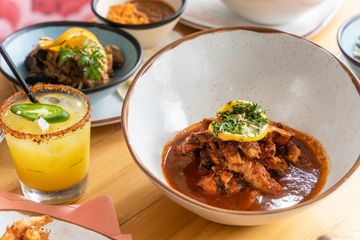Choose best mexican westchester NY cantinas for mouthwatering cuisine
Is Mexican Food Healthy And Balanced? Unboxing the Nutritional Conveniences of Conventional Active Ingredients
The question of whether Mexican food is healthy and balanced welcomes an exploration of its traditional active ingredients. Beans and corn offer as foundational staples, abundant in protein and fiber. Avocados supply beneficial fats, while numerous natural herbs and seasonings add flavor and health advantages - lunch and dinner. Together, these elements create a tapestry of nutrition. The healthfulness of Mexican cuisine commonly depends on preparation methods and part dimensions. What role do these variables play in establishing its general dietary worth?
The Power of Beans: Healthy Protein and Fiber-Rich Staples
Frequently neglected, beans offer as a cornerstone of Mexican food, offering a riches of nutritional benefits. Rich in protein, they are an outstanding plant-based alternative for those seeking to fulfill their nutritional healthy protein requires. This high healthy protein web content supports muscle repair work and growth, making beans important for both meat-eaters and vegetarians alike. In addition, beans are an extraordinary resource of dietary fiber, which helps in digestion and advertises a feeling of fullness, possibly assisting with weight management.
The variety of beans utilized in Mexican meals, such as black beans, pinto beans, and kidney beans, contributes to a diverse taste profile and can boost dishes nutritionally. Additionally, beans are reduced in fat and include necessary vitamins and minerals, consisting of folate, iron, and magnesium. With each other, these characteristics make beans an important component, supplying both nutrition and nutrition in conventional Mexican fare.

Corn: a Versatile Grain With Nutritional Benefits
Corn stands out as a flexible grain essential to Mexican cuisine, celebrated not just for its cooking applications but likewise for its outstanding dietary profile. As a key active ingredient in dishes like tortillas, tamales, and pozole, corn offers crucial nutrients that contribute to a well balanced diet. Rich in carbs, it functions as a considerable power resource, while additionally being reduced in fat, making it a beneficial alternative for numerous dietary demands.
Corn is an excellent resource of dietary fiber, which helps in digestion and advertises satiation. It consists of substantial quantities of vitamins such as B-complex vitamins, which are vital for power metabolism. The presence of anti-oxidants, particularly carotenoids, adds to general wellness by reducing oxidative stress. In addition, corn is gluten-free, satisfying those with gluten level of sensitivities. On the whole, the dietary advantages of corn highlight its value in traditional Mexican food and its function in a healthy and balanced diet.
Avocados: Healthy Fats and Nutrients in Every Bite
Avocados play a significant function in Mexican food, enhancing dishes with their luscious appearance and rich taste. Past their culinary charm, avocados are commemorated for their impressive dietary account. They are a rich source of healthy monounsaturated fats, which can help lower bad cholesterol levels and support heart health. Additionally, avocados are packed with vital vitamins and minerals, consisting of potassium, vitamin E, and B vitamins, adding to overall wellness.
The high fiber material in avocados help food digestion and advertises satiation, making them a beneficial enhancement to any type of dish. Their unique nutrient composition can likewise support skin wellness and give anti-inflammatory advantages. Including avocados right into standard Mexican dishes or appreciating them as a standalone snack can improve both taste and nutrition, demonstrating why they are a precious staple in Mexican cuisine. In general, avocados provide a delicious way to delight in healthy and balanced fats and essential nutrients in every bite.

Seasonings and Herbs: Flavorful Health And Wellness Boosters
While delighting in the rich tastes of Mexican cuisine, one can not overlook the necessary role that spices and natural herbs play in enhancing both preference and health. Components such as cilantro, oregano, and chili peppers not just contribute to the lively taste profile yet additionally provide significant wellness advantages. For circumstances, cilantro is recognized for its purifying buildings, assisting to remove heavy steels from the body, while oregano is loaded with anti-oxidants and possesses anti-inflammatory results.
Chili peppers, a staple in several Mexican meals, have capsaicin, which has actually been linked to boosted metabolism and pain alleviation. Additionally, flavors like cumin and coriander support digestion and might assist in blood sugar level regulation. Integrating these delicious health boosters into meals not just boosts the culinary experience yet likewise promotes general health, making Mexican cuisine not simply tasty, but also nutritionally beneficial.
Conventional Food Preparation Techniques: Enhancing Nourishment and Flavor
Traditional food preparation approaches in Mexican food play a crucial role in improving both nutrition and taste, as they often focus on time-honored methods and fresh ingredients. Strategies such as nixtamalization, where corn is soaked and cooked in an alkaline service, not just improve the nutrient profile of tortillas yet additionally boost their digestibility - mexican food. Additionally, making use of slow-moving cooking approaches, like cooking or braising, enables tastes to fuse perfectly while keeping the stability of the components
Frequently Asked Questions
Are Mexican Food Portions Normally Larger Than Other Cuisines?
Mexican food sections are frequently bigger than those of lots of various other foods. This particular reflects typical dining techniques, emphasizing common sharing and hearty meals, which can lead to an extra significant offering dimension in general.
How Does the Preparation Method Affect Healthiness of Mexican Food?
Preparation techniques considerably affect the healthfulness of Mexican food. Strategies such as barbecuing or steaming preserve nutrients, while frying can boost harmful fat web content. Choices of active ingredients and cooking styles inevitably figure out general dietary value.
Can Mexican Food Be Customized for Details Nutritional Limitations?
Mexican food can indeed be tailored for particular nutritional limitations. Replacements, such as utilizing corn tortillas for gluten-free diets or the chef including even more veggies, make it possible for individuals to appreciate standard flavors while accommodating different nutritional requirements.
What Are Usual Misconceptions Concerning Mexican Food and Wellness?
Typical misconceptions concerning Mexican food consist of the idea that it is naturally undesirable, excessively spicy, and only concentrated on fats. In truth, typical dishes commonly feature nourishing components and can be customized to different nutritional requirements.
Exist Healthier Options at Mexican Restaurants?
Much healthier alternatives at Mexican restaurants often consist of grilled meats, beans, and fresh veggies. Picking meals that emphasize whole ingredients and avoiding hefty sauces can result in an extra healthy dining experience, promoting general health.
The range of beans made use of in Mexican meals, such as black beans, pinto beans, and kidney beans, adds to a diverse taste profile and can enhance dishes nutritionally. Avocados play a substantial duty in Mexican food, enhancing recipes with their creamy structure and rich flavor. Integrating avocados into traditional Mexican recipes or appreciating them as a standalone treat can enhance both taste and nourishment, showing why they are a cherished staple in Mexican cuisine. While appreciating the rich flavors of Mexican food, one can not neglect the vital duty that spices and natural herbs play in boosting both taste and Clicking Here wellness. Conventional cooking methods in Mexican cuisine play an essential duty in boosting both nutrition and flavor, as they frequently prioritize classic methods and fresh components.